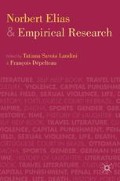Abstract
In An Essay on Time (Über die Zeit) (1984), Norbert Elias examines time from the perspective of the sociology of knowledge. He explores his questions in relation to his theory of the civilizing process, and by examining how time was understood and defined in early societies through to the industrial age, he extends his analysis of the civilizing process to the problem of modernity.
Access this chapter
Tax calculation will be finalised at checkout
Purchases are for personal use only
Preview
Unable to display preview. Download preview PDF.
References
Abbott, A. 2001. Time Matters: On Theory and Method. Chicago: The University of Chicago Press.
Baert, P. 1992. Time, Self and Social Being: Temporality within a Social Context. Aldershot, UK: Avebury.
Banaszczyk, T. 1989. Studia o przedstawieniach zbiorowych czasu i przestrzeni w dur-kheimowskiej sokole socjologicznej. Wrocław: Ossolineum.
Barrow, J. D. 1997. Teorie všeho: Hledání nejhlubšího vysvětlení (Theories of Everything). Prague: Mladá fronta.
Durkheim, E. 2002. Elementární formy náboženského života (The Elementary Forms of The Religious Life). Prague: Oikúmené.
Eliade, M. 1993. Mýtus o věčném návratu (The Myth of the Eternal Return). Prague: Oikoymenh.
Elias, N. 1976. Űber den Prozeß der Zivilisation: Soziogenetische und psychogenetische Untersuchungen, vols. 1–2. Frankfurt am Main: Suhrkamp.
Elias, N., and E. Dunning. 1983. Sport im Zivilisationsprozeß: Studien zur Figurations-soziologie. Münster: Lit-Verlag.
Elias, N. 1988. Über die Zeit. Frankfurt am Main: Suhrkamp.
Goudsblom, J. 1997. “Der Wurm und die Uhr: Über die Entstehung eines weltweiten Zeitregimes.” In E. Barlösius, E. Kürsat-Ahlers, and H. Waldhof (eds.), Distanzierte Verstrickungen: Die ambivalente Bindung soziologisch Forschender an ihren Gegenstand. Festschrift für Peter Gleichmann zum 65. Geburtstag, 125–45. Berlin: Edition Sigma.
Grün, J. 1993. Zeitrichtung: Ein philosophischer Grenzgang. Frankfurt am Main: Haag + Herchen.
Hawking, S. W. 1991. Stručná historie času (A Briefer History of Time). Prague: Mladá fronta.
Heidegger, M. 1996. Bytí a čas (Being and Time). Prague: Oikoymenh.
Kant, I. 2001. Kritika čistého rozumu. (Critique of Pure Reason). Prague: Oikoymenh.
Krob, J. 1999. Hledání času, místa, smyslu. Brno: Masarykova univerzita.
Leach, E. R. 1961. Rethinking Anthropology. New York: The Athlone Press.
Hamelin, O. 1907. Essai sur les éléments principaux de la représentation. Paris: Alcan.
Husserl, E. 1995. Přednášky k fenomenologii vnitřního časového vědomí (Lectures on Internal Time-Consciousness). Prague: Ježek.
Reichenbach, H. 1991. The Direction of Time. Berkeley, Oxford: University of California Press.
Sorokin, P. A. 1964. Sociocultural Causality, Space, Time: A Study of Referential Principles of Sociology and Social Science. New York: Russell-Russell Inc.
Sorokin, P. A., and R. K. Merton. 1937. “Social Time: A Methodological and Functional Analysis.” The American Journal of Sociology 5: 615–29.
Šrubař, I. 1996. “Geschichtlichkeit und Geschichte in der Phänomenologischen Theorie.” In J. Šubrt and J. Sedláček (eds.), Sborník k 65. narozeninám doc. PhDr. Eduarda Urbánka, CSc, 36–48. Prague: Katedra sociologie FF UK.
Editor information
Copyright information
© 2014 Tatiana Savoia Landini and François Dépelteau
About this chapter
Cite this chapter
Šubrt, J. (2014). Norbert Elias and the Enigma of Time. In: Landini, T.S., Dépelteau, F. (eds) Norbert Elias and Empirical Research. Palgrave Macmillan, New York. https://doi.org/10.1057/9781137312143_13
Download citation
DOI: https://doi.org/10.1057/9781137312143_13
Publisher Name: Palgrave Macmillan, New York
Print ISBN: 978-1-349-45718-2
Online ISBN: 978-1-137-31214-3
eBook Packages: Palgrave Social Sciences CollectionSocial Sciences (R0)

